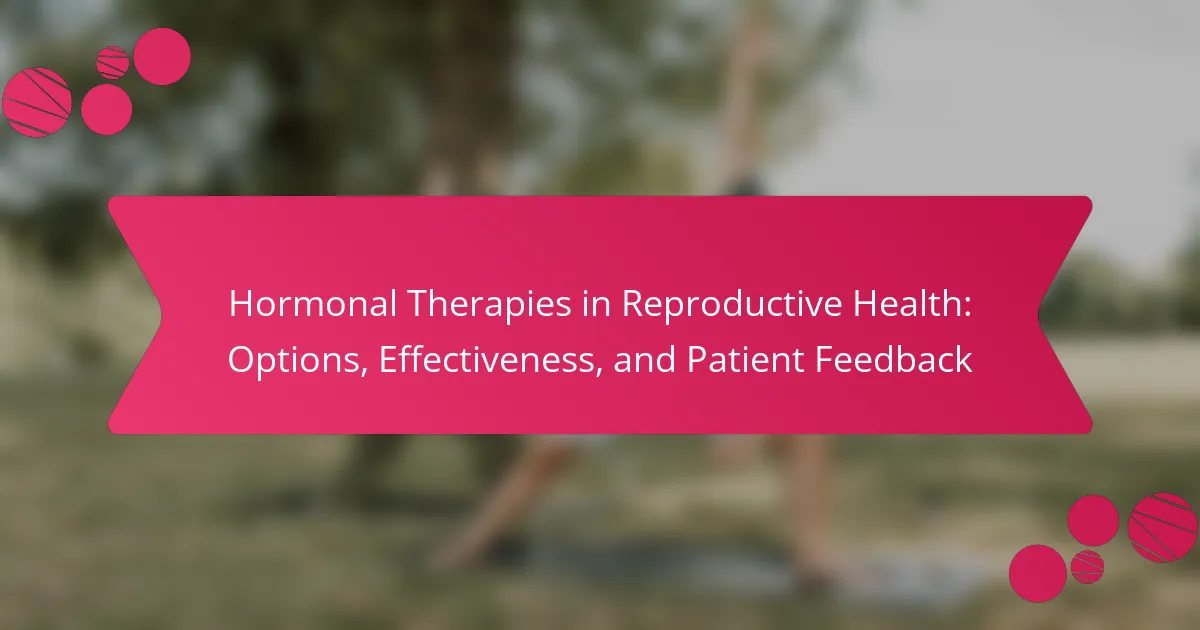Hormonal therapies in reproductive health offer effective solutions for managing menstrual cycles, alleviating menopausal symptoms, and enhancing fertility. This article explores primary options such as oral contraceptives, hormone replacement therapy, and fertility medications. It also examines their effectiveness rates, common side effects, and the impact of patient feedback on treatment experiences. Emerging trends in personalized medicine and innovative delivery systems will be discussed to highlight advancements in this field.
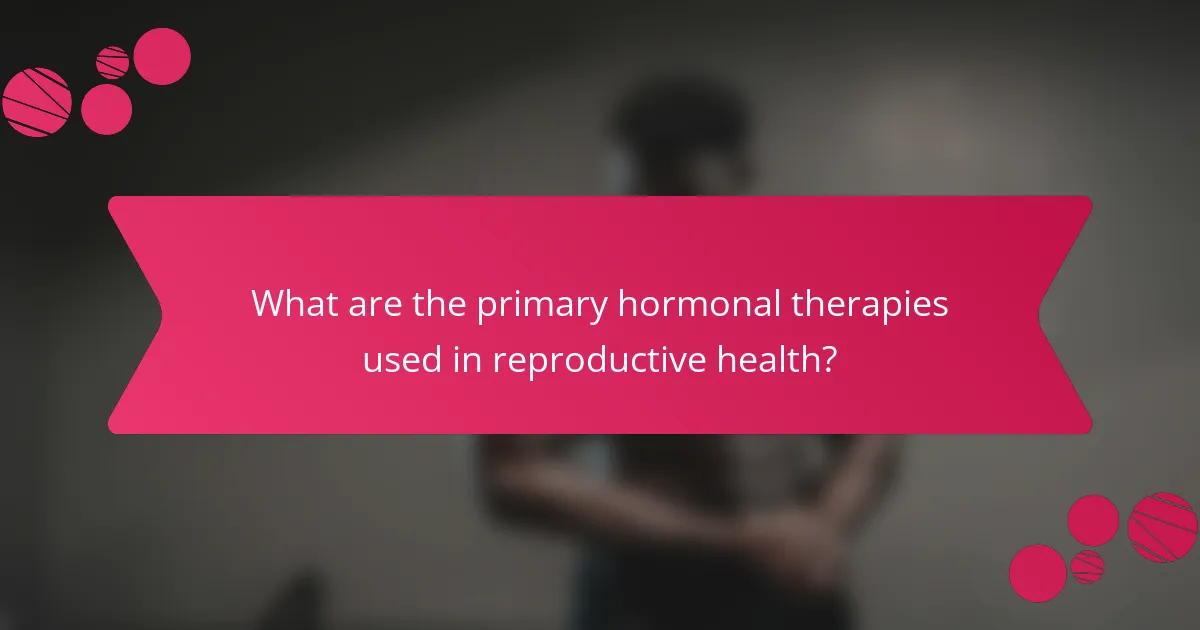
What are the primary hormonal therapies used in reproductive health?
Primary hormonal therapies in reproductive health include oral contraceptives, hormone replacement therapy (HRT), and fertility medications. These therapies effectively regulate menstrual cycles, alleviate menopausal symptoms, and enhance fertility outcomes.
Oral contraceptives are widely used for birth control and can also treat conditions like polycystic ovary syndrome (PCOS). HRT is commonly prescribed for menopausal women to manage symptoms such as hot flashes and mood swings. Fertility medications, such as clomiphene citrate, stimulate ovulation and increase chances of conception.
Patient feedback indicates high satisfaction with these therapies, particularly regarding improved quality of life and reproductive health. However, individual responses vary, and some may experience side effects, highlighting the importance of personalized treatment plans.
How do hormonal contraceptives work?
Hormonal contraceptives primarily work by releasing hormones that prevent ovulation, thicken cervical mucus, and alter the uterine lining. These mechanisms effectively inhibit pregnancy. Most hormonal contraceptives contain estrogen and progestin, which regulate the menstrual cycle and reproductive functions. Effectiveness rates exceed 99% when used correctly, making them a reliable option for many individuals. Patient feedback often highlights benefits such as reduced menstrual symptoms and improved skin conditions, contributing to their popularity in reproductive health.
What are the roles of hormone replacement therapies?
Hormone replacement therapies (HRT) play crucial roles in managing symptoms associated with hormonal imbalances, particularly during menopause. They alleviate hot flashes, improve mood, and enhance quality of life. HRT options include estrogen therapy, progesterone therapy, and combination therapies. The effectiveness varies by individual, with many reporting significant symptom relief. Patient feedback often highlights improved emotional well-being and physical comfort as key benefits. However, it is essential to consider potential risks associated with long-term use, such as cardiovascular issues and certain cancers.
Which hormonal treatments are used for fertility enhancement?
Hormonal treatments for fertility enhancement include Clomiphene Citrate, Gonadotropins, and Metformin. Clomiphene Citrate stimulates ovulation and is effective in women with irregular cycles. Gonadotropins directly stimulate the ovaries, often used in assisted reproductive technologies. Metformin improves insulin sensitivity, beneficial for women with polycystic ovary syndrome. Each treatment’s effectiveness varies based on individual health factors and underlying conditions, with patient feedback generally highlighting positive outcomes when tailored to specific needs.
How do hormonal therapies differ across regions?
Hormonal therapies vary significantly across regions due to cultural, regulatory, and healthcare system differences. In North America, a wide range of hormonal treatments, including combined oral contraceptives and hormone replacement therapy, are commonly prescribed with extensive patient education. In contrast, some regions in Africa may have limited access to these therapies due to economic constraints and varying levels of healthcare infrastructure.
In Europe, hormonal therapies are often regulated by stringent guidelines, ensuring safety and efficacy, while Asia may see a mix of traditional and modern approaches to hormonal treatment. Patient feedback also varies; in some regions, satisfaction with hormonal therapies is high due to comprehensive healthcare support, while in others, patients report challenges related to availability and cultural acceptance.
Overall, the effectiveness and acceptance of hormonal therapies are influenced by local practices, education, and healthcare policies, reflecting a complex landscape in reproductive health management.
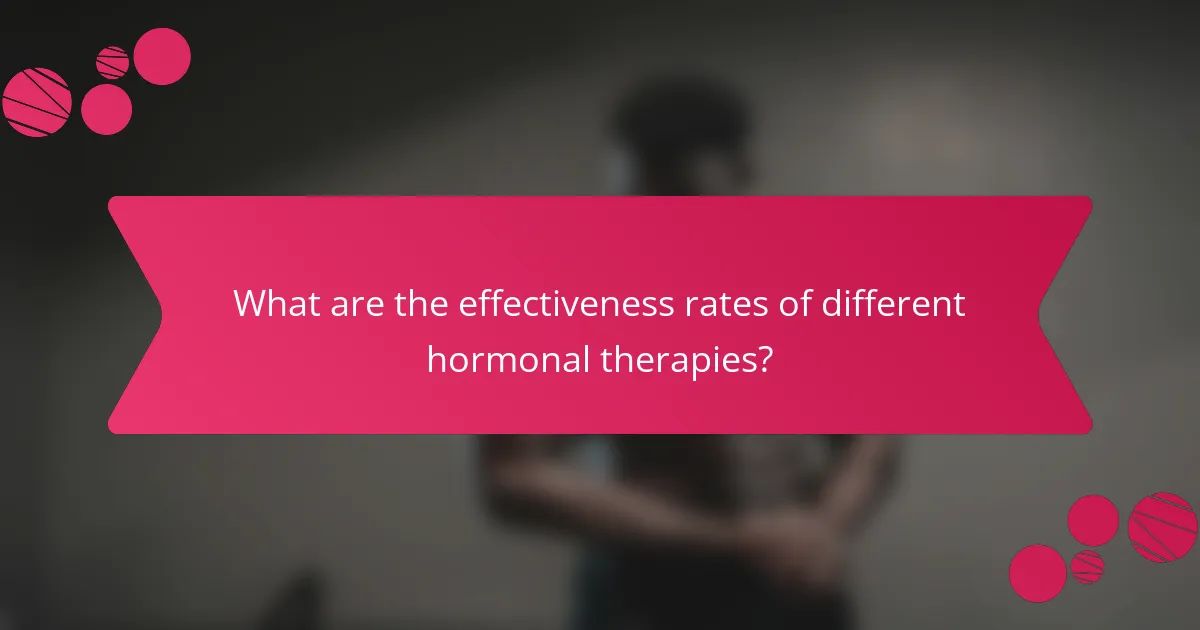
What are the effectiveness rates of different hormonal therapies?
Effectiveness rates of different hormonal therapies vary significantly. For example, combined oral contraceptives have an effectiveness rate of 91%, while hormonal IUDs can be as high as 99%. Hormone replacement therapy (HRT) shows effectiveness in alleviating menopausal symptoms, with patient satisfaction rates around 80%. Each therapy’s effectiveness can depend on individual health factors and adherence to the treatment plan.
How is success measured in hormonal treatments?
Success in hormonal treatments is measured by symptom relief, hormonal balance, and patient satisfaction. Key metrics include the reduction of specific symptoms, normalization of hormone levels, and feedback from patients regarding their quality of life. Effectiveness varies based on individual responses and treatment types. For example, estrogen therapy may alleviate menopausal symptoms, while testosterone treatments can enhance mood and energy levels. Regular monitoring of hormone levels and patient feedback helps healthcare providers assess treatment success and make necessary adjustments.
What factors influence the effectiveness of hormonal therapies?
The effectiveness of hormonal therapies is influenced by several factors, including patient age, hormonal balance, and therapy type. Individual responses vary significantly due to genetics and overall health. For example, younger patients may respond better to certain therapies compared to older patients. Additionally, the specific hormonal imbalance being targeted plays a crucial role in determining therapy success. Patient adherence to the treatment plan and lifestyle factors, such as diet and exercise, also contribute to effectiveness.
Which hormonal therapy has the highest success rates in specific populations?
Hormonal therapy with the highest success rates varies by population. For instance, estrogen therapy shows significant effectiveness in postmenopausal women, achieving up to 80% relief from menopausal symptoms. In transgender women, combined estrogen and anti-androgen therapies yield high satisfaction rates, often exceeding 90%. Additionally, women with polycystic ovary syndrome benefit from metformin combined with hormonal treatments, improving ovulation rates by 60%. Success rates can differ based on individual health profiles and specific hormonal therapies used.
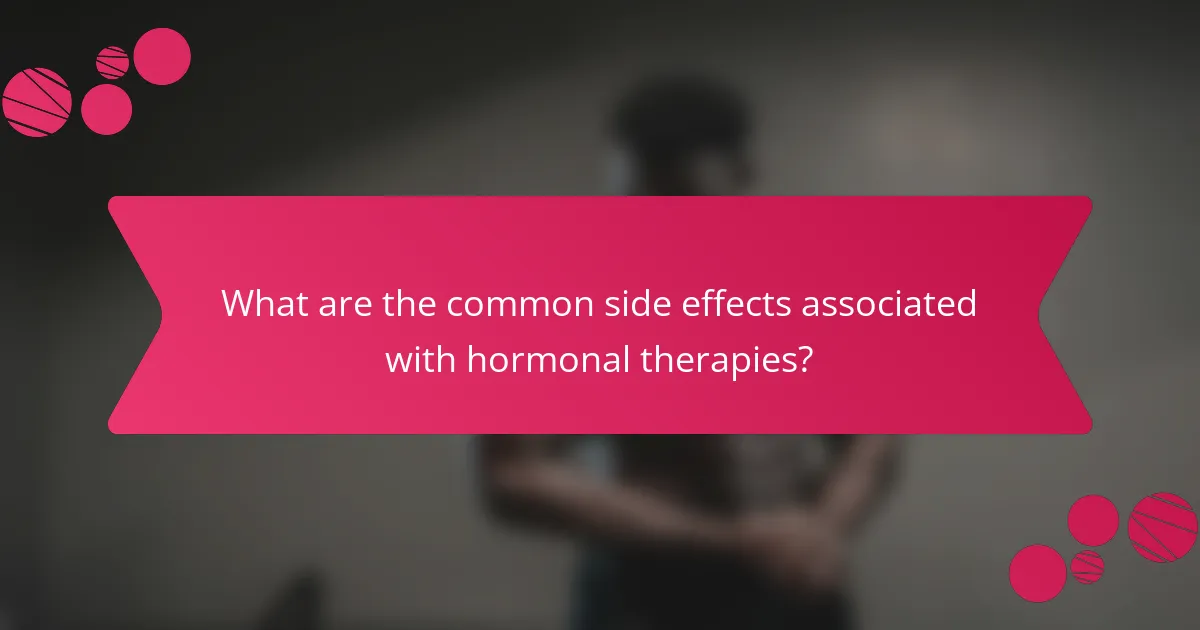
What are the common side effects associated with hormonal therapies?
Common side effects of hormonal therapies include mood swings, weight gain, nausea, and fatigue. These effects vary based on the specific therapy and individual response. Patients may also experience changes in libido and menstrual irregularities. Understanding these side effects can enhance patient feedback and improve treatment effectiveness.
How do side effects vary by therapy type?
Side effects of hormonal therapies vary significantly depending on the specific therapy type. For instance, combined oral contraceptives may lead to nausea and weight gain, while progestin-only methods often cause irregular bleeding.
Therapies targeting estrogen can result in mood swings and breast tenderness, whereas testosterone treatments might induce acne and hair growth. Each therapy type presents unique side effects due to differing hormonal mechanisms and patient responses.
Understanding these variations aids in selecting the most suitable option for reproductive health.
What are the long-term health implications of hormonal therapies?
Long-term health implications of hormonal therapies can include both benefits and risks. These therapies can alleviate symptoms of hormonal imbalances, improve quality of life, and reduce the risk of osteoporosis. However, potential risks include increased chances of certain cancers, cardiovascular issues, and metabolic changes. Regular monitoring is essential to manage these effects effectively.
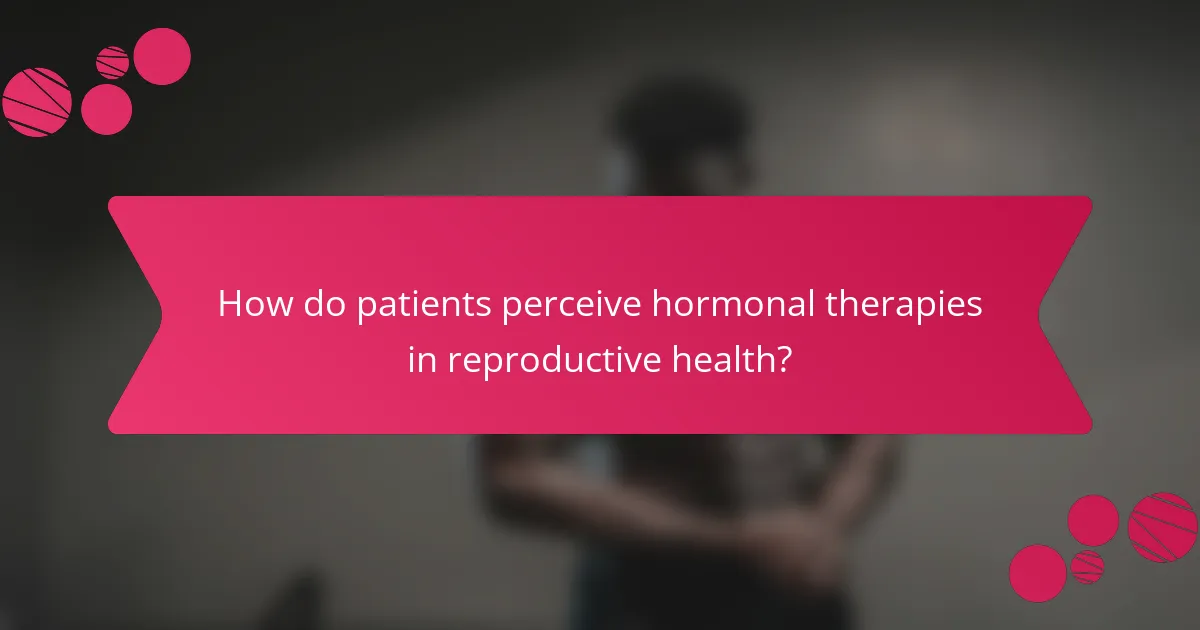
How do patients perceive hormonal therapies in reproductive health?
Patients generally perceive hormonal therapies in reproductive health as effective but have mixed feelings about side effects. Many appreciate the benefits, such as symptom relief and improved quality of life. However, concerns about adverse effects, including mood changes and weight gain, can influence their overall satisfaction.
Studies indicate that patient education significantly impacts perceptions. When patients understand the mechanisms and expected outcomes of hormonal therapies, they are more likely to have positive feedback. Additionally, personalized treatment plans that consider individual health profiles enhance patient acceptance and adherence to therapy.
Support from healthcare providers plays a crucial role in shaping perceptions. Open communication and addressing concerns can lead to better patient experiences. Ultimately, patient feedback highlights the importance of balancing effectiveness with manageable side effects in hormonal therapies.
What feedback do patients provide on their experiences?
Patients generally report mixed feedback on hormonal therapies in reproductive health. Many appreciate the effectiveness in managing symptoms like irregular periods and mood swings. However, some express concerns about side effects such as weight gain and mood changes. A significant number highlight the importance of personalized treatment plans to maximize benefits and minimize adverse effects. Overall, patient experiences emphasize the need for ongoing communication with healthcare providers to ensure optimal outcomes.
How does patient feedback influence treatment options?
Patient feedback significantly shapes treatment options for hormonal therapies in reproductive health. Insights from patients help healthcare providers tailor therapies to meet individual needs and preferences. For example, feedback can reveal the effectiveness of specific hormone treatments, leading to adjustments in dosages or alternative options. This patient-centered approach enhances overall satisfaction and treatment outcomes. Engaging patients in decision-making fosters trust and encourages adherence to prescribed therapies.
What are the common concerns raised by patients regarding hormonal therapies?
Patients commonly express concerns about side effects, effectiveness, and long-term impacts of hormonal therapies. Many report anxiety over weight gain, mood changes, and the risk of blood clots. Effectiveness varies, leading to questions about treatment duration and the possibility of needing adjustments. Additionally, patients worry about the potential for hormonal therapies to influence fertility and overall health.
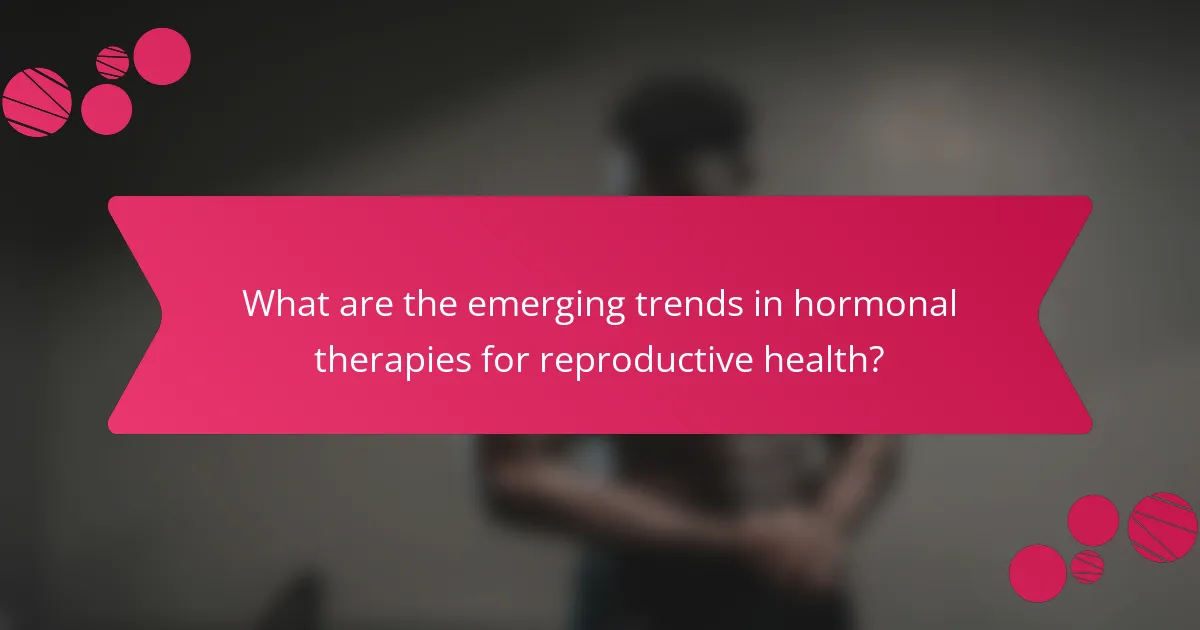
What are the emerging trends in hormonal therapies for reproductive health?
Emerging trends in hormonal therapies for reproductive health focus on personalized medicine, bioidentical hormones, and innovative delivery systems. Researchers are exploring tailored treatments that consider individual genetic profiles, enhancing effectiveness and minimizing side effects. Bioidentical hormones, derived from natural sources, are gaining popularity due to their perceived safety and compatibility with the body. Additionally, new delivery methods, such as transdermal patches and subcutaneous implants, improve patient compliance and optimize hormone absorption. These advancements aim to provide safer, more effective options for managing reproductive health issues.
How are new therapies being developed and tested?
New therapies for hormonal treatments in reproductive health are developed through rigorous research and clinical trials. These processes involve identifying potential compounds, assessing their safety and efficacy, and gathering patient feedback to refine treatment options.
Research often begins with laboratory studies to understand hormonal interactions. Once a promising therapy is identified, it moves into preclinical testing, followed by phased clinical trials. Patient feedback is crucial at each stage to ensure therapies meet real-world needs and preferences.
For example, hormone replacement therapies are continually evaluated for effectiveness and side effects. Recent studies show that personalized approaches enhance patient satisfaction and outcomes.
Overall, the development of new hormonal therapies is a dynamic process that integrates scientific innovation with patient-centered care.
What role does technology play in advancing hormonal treatments?
Technology significantly enhances hormonal treatments by improving precision, accessibility, and patient monitoring. Advanced methods like telemedicine facilitate remote consultations, allowing patients to receive personalized care without geographical constraints. Wearable devices track hormone levels and symptoms in real-time, enabling timely adjustments to therapies. Artificial intelligence analyzes patient data to predict treatment outcomes, optimizing effectiveness. Furthermore, technology fosters patient engagement through apps that provide education and support, leading to better adherence and satisfaction. Overall, these innovations are transforming hormonal therapies in reproductive health, making them more effective and patient-centered.
How are cultural attitudes shaping the future of hormonal therapies?
Cultural attitudes significantly influence the future of hormonal therapies by shaping acceptance, accessibility, and innovation. As societal views evolve, more individuals seek personalized treatment options that align with their values. This shift encourages healthcare providers to prioritize patient-centered approaches, enhancing the effectiveness of hormonal therapies. For instance, increased awareness and advocacy lead to improved communication between patients and practitioners, fostering trust and better outcomes. Additionally, cultural sensitivity in treatment plans can address unique needs, promoting wider acceptance of hormonal therapies in diverse populations.
What best practices should patients follow when considering hormonal therapies?
Patients considering hormonal therapies should consult healthcare professionals, understand potential side effects, and review treatment options thoroughly. Engaging in open discussions about personal health history and treatment goals is crucial. Monitoring responses to therapy and adjusting as needed ensures optimal outcomes. Staying informed about the latest research and patient feedback can enhance decision-making.
